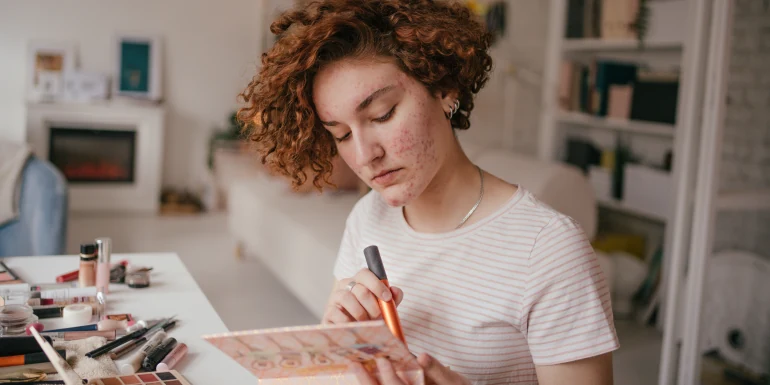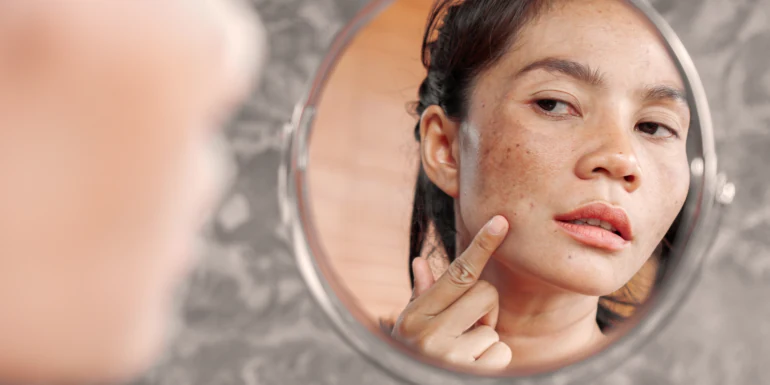
Rosacea: Cause and treatment
If your face suddenly turns hot and red, the skin condition rosacea may be to blame. Learn more about the symptoms and causes of rosacea, and how you can avoid flare-ups and treat rosacea.
Rosacea: What is it?
Generally speaking, rosacea starts out as a reddening of the face. Depending on its severity, it can also lead to small, raised spots, blisters, and burning and itchy skin on your face. Rosacea is a chronic skin condition and those suffering from it will experience flare-ups, with typical characteristics including redness and enlarged blood vessels.
The condition mostly affects the face but the inflammation can also affect the eyes, scalp, neck and chest. A rosacea flare-up comes on very suddenly and the severity of the flare-up will depend on how severe the condition is.
What are the stages of rosacea?
Rosacea is split into three levels of severity:
- Level 1 – Erythematotelangiectatic rosacea:
The skin is permanently reddened, with visibly enlarged blood vessels (couperose). The skin on the face is also very dry, itchy and can be flaky. - Level 2 – Rosacea papulopustulosa
The permanent reddening of the first stage is accompanied by papules and pustules; rosacea papulopustulosa is often mistaken for acne, though the skin does not have any spots. - Level 3 – hypertrophic Rosacea
In the third stage, alongside the symptoms mentioned above, there are also growths on the connective tissue and sebaceous glands on the nose, forehead, chin, ears and eyelids – these usually appear more commonly in men over the age of 50.
Rosacea: what causes this condition?
The cause of rosacea is still unclear. Some theorise that the condition is caused by a genetic predisposition and a weakened immune system. However, what is clear is that a combination of certain triggers can spark a rosacea flare-up. These include:
- Diet: there are certain foods that should be avoided if you have rosacea. But what are they? In particular, you should avoid spicy, very hot and fatty foods, tomatoes, citrus fruits, liver, egg and dairy products, coffee, black tea, and alcohol, especially red wine.
Doctors recommend that those with rosacea follow a basic diet that is low in histamines and inflammatory foods - Stress
- Nicotine
- Hot baths and trips to the sauna
- Temperature fluctuations
- Cosmetic products that irritate the skin and contain, for example, menthol, parabens, sulphates, perfumes, fruit acids, alcohol or essential oils
- Mites: researchers have discovered that hair follicle mites can also trigger a flare-up. It is normal for these mites to be found on the skin, but those with rosacea have excessive numbers of them. Their skin reacts to this and produces antibodies that fight the mites. This then generates an inflammatory reaction on the skin surface
- Intestinal effects: those with rosacea often also suffer from intestinal problems. For this reason, it is important that they ensure they have healthy intestinal flora and that they strengthen these with probiotics
- UV radiation from the sun
Those with rosacea should avoid UV radiation as this can exacerbate the condition. Good UV protection is essential. Dermatologists recommend that those suffering from rosacea apply high-factor sun cream every day.
But what sun cream should you use if you have rosacea? Since certain cosmetic products can trigger a rosacea flare-up, it is recommended that you consult a pharmacist when buying sun cream. Titanium dioxide and zinc oxide are particularly effective physical sun blockers for those with rosacea.
Too much UV radiation does not only cause harm if you have rosacea.
Can rosacea be cured?
Since the exact cause of rosacea is still unknown, there is no effective way of treating it. However, we do know what triggers can exacerbate rosacea. A first step, then, is to avoid these triggers (see the section ‘Rosacea: what causes this condition?’). Those with rosacea may find it helpful to keep a symptom diary to identify their personal triggers.
Other important actions are:
Creams for rosacea
We know that unusually high numbers of mites on the skin can trigger a rosacea flare-up. Certain creams containing antibiotics (such as metronidazole) have proven to be effective because they kill off the mites and therefore reduce the inflammation. Special gels containing azelaic acid are also effective for rosacea. Plus, there are now a number of cosmetic products that have been specially developed for those with rosacea. They can mostly be found in pharmacies.
Treating rosacea naturally
Certain home remedies can help alleviate the redness caused by rosacea. Thanks to their anti-inflammatory properties, applying a camomile, honey or aloe vera cold compress can help calm irritated skin.
Laser treatment for rosacea?
Existing enlarged blood vessels (couperose) can be removed with laser treatment but since rosacea is a chronic skin condition, these may reappear over time.
Rosacea can be kept under control with the right diet, good sun protection and by avoiding certain triggers. Rely on using a high-factor sun cream every day, cosmetics for sensitive skin and an alkaline diet.

The expert provided the editorial team with advice and input for this article. Nadia Cifarelli (BSc Psychology, certified holistic health advisor) works for the Helsana health consultation service. She helps customers on issues to do with prevention, nutrition and mental health.


Newsletter
Find out more about current health issues every month and get all the information you need about our attractive offers from all Helsana Group companies * delivered by e-mail to read whenever it suits you. Our newsletter is free of charge and you can sign up here:
We did not receive your information. Please try again later.
* The Helsana Group comprises Helsana Insurance Company Ltd, Helsana Supplementary Insurances Ltd and Helsana Accidents Ltd.